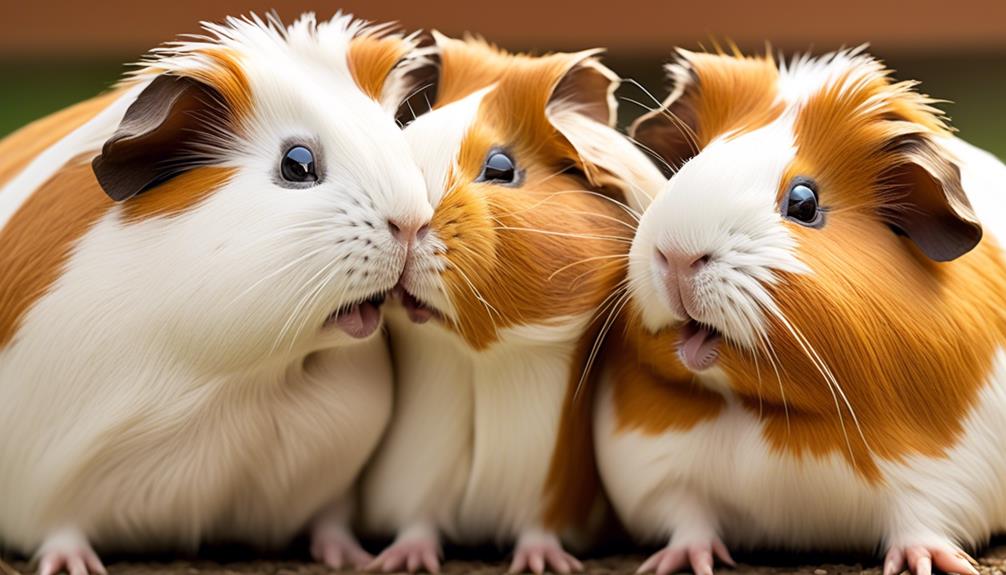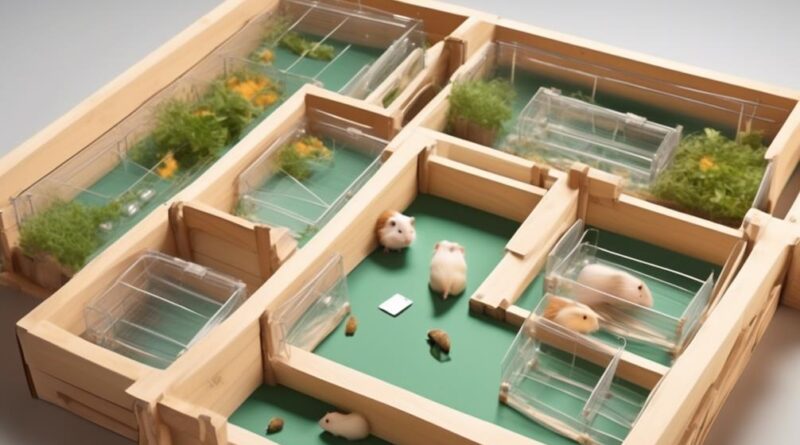What Are Key Steps for Successful Guinea Pig Breeding?
Are you considering breeding guinea pigs and want to ensure a successful and rewarding experience?
Breeding these adorable animals can be a fulfilling endeavor, but it requires careful planning and attention to detail. From selecting healthy breeding stock to providing proper care for newborns, there are several key steps that can contribute to a successful breeding program.
By understanding and implementing these fundamental principles, you can help ensure the health and well-being of both the parent guinea pigs and their offspring. But what exactly are these crucial steps, and how can they be effectively implemented?
Understanding these key elements is essential for anyone looking to venture into guinea pig breeding.
Selecting Healthy Breeding Stock
When selecting healthy breeding stock, prioritize individuals with robust physical attributes and strong genetic backgrounds. It's crucial to conduct thorough breeding stock evaluation to ensure the health and genetic diversity of future generations.
Begin by examining the physical characteristics of potential breeding stock. Look for guinea pigs with clear, bright eyes, glossy fur, and a lively, energetic demeanor. These traits are indicators of good health and vitality.
Additionally, assess the genetic background of the animals. Consider their lineage and any potential hereditary health issues. Genetic diversity considerations are essential to maintain a robust and resilient breeding stock. Selecting individuals with diverse genetic backgrounds helps minimize the risk of inherited diseases and promotes overall genetic fitness within the population.
As you evaluate potential breeding stock, remember that genetic diversity is key to the long-term success of your breeding program. It's important to avoid inbreeding, as this can lead to a higher incidence of genetic abnormalities and health issues in offspring. Instead, strive to introduce new genetic material into your breeding stock periodically. This can be achieved by acquiring guinea pigs from different sources or collaborating with other reputable breeders to exchange breeding stock.
Providing Proper Housing and Environment
To ensure the continued health and vitality of your breeding stock, it's essential to provide proper housing and an environment conducive to their well-being. Here are some key steps to consider:
- Creating Enrichment: Guinea pigs are curious and social animals that thrive in enriched environments. Provide them with tunnels, hiding spots, and chew toys to keep them mentally stimulated and prevent boredom. Regularly rotate and introduce new toys to keep their environment engaging.
- Maintaining Cleanliness: Cleanliness is paramount to the health of your guinea pigs. Regularly clean their living space, including removing soiled bedding, and ensuring fresh water and food are readily available. A clean environment helps prevent the spread of diseases and keeps your guinea pigs healthy and happy.
- Proper Ventilation and Temperature: Ensure that the guinea pig enclosure is well-ventilated and maintains a consistent temperature. Avoid placing the enclosure in direct sunlight or drafty areas. Guinea pigs are sensitive to temperature extremes, so it's important to keep their environment comfortable and stable.
- Adequate Space: Guinea pigs need ample space to move around, exercise, and exhibit natural behaviors. Provide a spacious enclosure that allows for separate areas for eating, resting, and playing. A larger living space promotes physical activity and overall well-being.
Monitoring Breeding Behavior

As a breeder, it's important to closely observe the guinea pigs' interactions and behaviors to monitor their breeding readiness and compatibility. When introducing breeding pairs, pay attention to their behavioral patterns. Guinea pigs have distinct body language and vocalizations that can indicate their readiness to breed. Signs of aggression or dominance, as well as signs of affection and mating behavior, should be looked for. It's crucial to ensure that the pair is compatible and not exhibiting any signs of distress or fear towards each other.
Watch for behavioral cues such as chattering teeth, rumbling, and mounting behavior, as these are all signs that the guinea pigs may be ready to mate. Additionally, observe their general interactions, as a comfortable and harmonious relationship is essential for successful breeding. If the guinea pigs are constantly fighting or showing signs of stress, it's best to separate them and reconsider the pairing.
Monitoring the breeding behavior also involves keeping track of the female guinea pig's estrus cycle. Female guinea pigs have a regular estrus cycle, and observing their behavior during this time can help determine the best time for breeding. Look for signs of receptivity and willingness to mate, such as increased vocalization and a more relaxed body posture.
Managing Pregnancy and Birth
Monitoring the breeding behavior has prepared you to now focus on effectively managing the pregnancy and birth of your guinea pigs. As your guinea pig's due date approaches, it's important to be well-prepared for the upcoming birth and the care needed afterward. Here's what you need to know:
- Preparing for labor: Create a comfortable birthing environment by providing a warm, quiet, and secluded area with plenty of bedding. Prepare a nesting box filled with soft hay for the mother to give birth in. Monitor the pregnant guinea pig closely as the due date nears and be prepared to provide assistance if needed.
- Postpartum care: Once the babies are born, ensure that the mother is nursing them and that they're warm and well-fed. Keep the mother's cage clean and provide her with a diet rich in vitamin C to support her recovery.
- Handling complications: Despite careful preparation, complications may arise during birth. Watch for signs of distress in the mother, such as excessive bleeding or prolonged labor. If you notice any concerning symptoms, seek immediate veterinary care.
- Seeking veterinary care: It's essential to have a trusted veterinarian who's experienced in treating guinea pigs. Before the birth, establish a relationship with a veterinarian who can provide guidance and assistance in case of emergencies.
Caring for Newborn Guinea Pigs
Once the newborn guinea pigs arrive, your primary focus should be on ensuring their health and well-being. Newborn care is crucial in the initial stages of their lives.
One of the most important aspects of caring for newborn guinea pigs is feeding. Ensure that the mother is providing enough milk, as it contains essential nutrients for their growth and development. If necessary, you may need to supplement their diet with hand-feeding using a syringe designed for small animals. It's important to monitor their weight gain to ensure they're receiving adequate nutrition.
Handling and socialization are also key components of caring for newborn guinea pigs. While it's important to handle them gently and minimally during the first few days to allow bonding with the mother, gradual socialization is necessary for their development.
Begin by spending short periods of time with the newborn guinea pigs to help them become accustomed to human interaction. This will contribute to their overall socialization and help them become comfortable with being handled as they grow.
Weaning and Socialization
During the weaning process, gradually introduce solid foods to the newborn guinea pigs to facilitate their transition from milk to a more varied diet. This is an essential step in their development and ensures they receive the necessary nutrients for growth.
Additionally, socialization is crucial during this phase to help the guinea pigs become accustomed to human interaction and bond with their caretakers.
To successfully wean and socialize newborn guinea pigs, consider the following key steps:
- Gradual Introduction of Solid Foods: Begin by offering small amounts of fresh vegetables, hay, and pellets alongside their mother's milk. Slowly increase the proportion of solid foods while decreasing the milk intake over a period of three to four weeks.
- Handling and Interaction: Start gently handling the newborn guinea pigs for short periods every day to accustom them to human touch. This helps them become more comfortable and less skittish around people.
- Behavior Training: Use positive reinforcement techniques such as offering treats and gentle petting to encourage desirable behaviors. This helps in establishing a positive association with human interaction.
- Bonding Time: Spend regular, quiet bonding time with the guinea pigs, such as reading aloud near their enclosure or simply sitting nearby. This helps them get used to your presence and voice, strengthening the bond between you and the guinea pigs.
Health and Nutritional Considerations

As you continue to care for your newly weaned guinea pigs and foster their socialization, it's crucial to focus on their health and nutritional needs for optimal development. Nutritional supplements play a vital role in ensuring that your guinea pigs receive the necessary vitamins and minerals for their growth.
Vitamin C is particularly important for guinea pigs as they can't produce it naturally, so providing them with vitamin C-rich foods or supplements is essential. Additionally, ensuring that your guinea pigs have a balanced diet with a constant supply of hay, fresh vegetables, and high-quality pellets is crucial for their overall health and well-being.
Regular health check-ups are also essential for monitoring the well-being of your guinea pigs. A veterinarian specializing in small animals can provide guidance on the specific nutritional requirements of guinea pigs and conduct thorough health examinations to detect any potential issues early on. These check-ups are crucial for identifying and addressing any health concerns promptly, ensuring that your guinea pigs remain healthy and thrive.
Finding Suitable Homes for Offspring
To ensure the well-being of the offspring, it's essential to find suitable homes that can provide a nurturing environment and proper care. As a responsible breeder, it's crucial to prioritize the welfare of the guinea pigs and ensure they're placed in loving and capable hands. Here are key steps to consider during the adoption process:
- Screen Potential Owners: Take the time to thoroughly vet potential adopters. Inquire about their experience with guinea pigs, their knowledge of proper care, and the environment they can provide for the animals. This helps ensure responsible ownership and a suitable match for the guinea pigs.
- Educate Adopters: Provide information about guinea pig care and behavior to prospective owners. This can help them understand the needs of the guinea pigs and be better prepared to provide a suitable home. Educating adopters also promotes breeder ethics and contributes to addressing pet overpopulation by preventing impulsive or uninformed adoptions.
- Follow Up: Stay connected with new owners after the adoption. Offer support and guidance, and encourage them to reach out with any questions or concerns. This ongoing relationship can help ensure the well-being of the guinea pigs and address any potential issues that may arise.
- Contract and Return Policy: Have a clear adoption contract outlining the responsibilities of the new owners and your commitment to take back the guinea pigs if the adoption doesn't work out. This helps guarantee the long-term welfare of the animals and promotes responsible ownership practices.
Frequently Asked Questions
What Are the Common Genetic Health Issues in Guinea Pigs and How Can Breeders Address Them?
To address genetic health issues in guinea pigs, genetic testing is crucial. When breeding, incorporate breeding strategies that aim to minimize the risk of passing on genetic health issues.
Additionally, regular health monitoring and preventive care are essential. By staying informed about potential genetic health concerns and taking proactive measures, you can help ensure the well-being of guinea pigs in your breeding program.
How Do Breeders Determine the Best Time for Breeding Their Guinea Pigs?
To determine the best time for breeding your guinea pigs, consider their age, health, and behavior. Monitor the female's estrous cycle for signs of receptivity. Introduce the male when the female shows interest, but be cautious of overbreeding.
Consult a veterinarian for guidance on breeding timing strategies and best practices. Keep an eye on your guinea pigs' interactions and adjust the breeding schedule accordingly to ensure successful outcomes and healthy offspring.
What Are Some Common Challenges Breeders May Face During the Pregnancy and Birth Process, and How Can They Be Managed?
Managing pregnancy challenges involves:
- Monitoring the guinea pig's diet
- Providing a comfortable and stress-free environment
- Seeking veterinary care for any signs of complications.
Handling birth complications may require:
- Assisting with the delivery
- Providing warmth and comfort to the mother and newborns
- Seeking immediate veterinary assistance if needed.
It's crucial to be prepared for potential challenges and have a plan in place to address them promptly.
Are There Any Specific Socialization Techniques Recommended for Guinea Pigs to Ensure They Are Well-Adjusted and Friendly?
To socialize your guinea pigs and ensure they're friendly, try gentle handling methods and positive interactions. Socialization techniques like regular, gentle handling can help your guinea pigs become more comfortable with human interaction. Spend time with them daily, offering treats and talking softly.
Introduce new experiences gradually and provide plenty of toys and hiding spots in their enclosure. This will help them feel more secure and well-adjusted.
What Are Some Potential Legal Considerations or Regulations That Breeders Should Be Aware of When Finding Suitable Homes for Their Guinea Pig Offspring?
When finding homes for your guinea pig offspring, it's crucial to be aware of potential legal considerations and ethical responsibilities. Some areas might have regulations on breeding or animal sales.
It's important to research and comply with any relevant laws and ensure that the new owners are capable of providing a suitable environment for the guinea pigs. Upholding ethical standards and following legal requirements are key in responsibly finding homes for your guinea pig offspring.
Conclusion
So, if you're thinking about breeding guinea pigs, remember to start by:
- Selecting healthy breeding stock and providing the proper housing and environment.
- Keeping a close eye on breeding behavior, managing pregnancy and birth, and caring for the newborn guinea pigs.
- Not forgetting about weaning and socialization, as well as health and nutritional considerations.
Finally, make sure to find suitable homes for the offspring to ensure their well-being.
Good luck with your guinea pig breeding journey!
